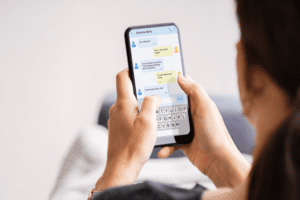Customer service exists to meet your customers where they are and problem solve together so that they feel heard and get a solution to whatever their problem may be. However, not every company is excelling in delighting their customers. This blog will outline 5 important customer service skills that your team should have and how to develop them.
We also have a Premium Customer Service Plan that helps businesses excel at customer service without having to lift a finger.
At some point, you’ve probably had a bad customer service experience. You probably have a time that immediately comes to mind. Maybe you needed a speedy return and the line at the store was taking forever. Maybe you needed a return but did not meet the store policy’s requirements and no one was willing to hear your side.
Or maybe you called the customer service hotline and were put on hold for what felt like forever.
Any of these experiences are frustrating to say the least. And your customers expect the best.
Let’s take a look at good customer service skills to implement today.
Skill #1: Active Listening
According to MindTools, we only remember between 25 and 50 percent of what we hear.
We spend a lot of time a day listening, but we are not super skilled at retaining that information. Listening is how we take in information and the same holds true for customer service.
The priority is to delight the customer, but you cannot delight the customer if you have no idea what their problem is. Do you normally get distracted when someone is talking?
MindTools gives a helpful tip. They recommend repeating the person’s words as they say them so that you are more likely to remember them.
Encourage your customer service team to start there. Having them bring attention to the words that the customers are saying while they are speaking with them on the phone or in-person will, at least, make them aware of what the customer is saying, instead of predicting how they will respond next.
Additionally, it can be helpful to show the person that you are listening with a non-verbal cue. A simple head nod or “uh-huh” sends the message that you are tuned in and listening to what they have to say. Be careful though, you do not want this signal to be misinterpreted as an agreement with what they are saying. Periodic repeating back of what they said can be helpful. Or asking questions to clarify such as,” Is this what you mean when you say x?” or “Am I hearing you correctly? Do you mean x?”
People love to feel heard and validated. They will respect your customer service team more if they feel heard by them and thus continue to use your business for how they are treated thus making listening one of the core customer service skills.
Skill #2: Persuading
74% people spend more money when they’ve had a positive service experience-up to 14% more, according to Salesforce.
With this number in mind, it is important that customer service representatives know when to inform customers of other products or services that they maybe haven’t yet considered. A customer could be really frustrated with a current product, but hasn’t even considered that another could be a better fit. Customer service representatives want to know as much as possible about all products to be able to encourage customers to make an informed decision.
Top-notch customer service skills include persuading customers to stay with your company and choosing the right product for them.
Skill #3: Empathizing
Another customer service aptitude to consider is empathy.
Merriam Webster defines empathy as follows:
“the action of understanding, being aware of, being sensitive to, and vicariously experiencing the feelings, thoughts, and experience of another of either the past or present without having the feelings, thoughts, and experience fully communicated in an objectively explicit manner”
There isn’t an easy formula for feeling empathy with every single person. It is a skill that is developed over time and may look different in practice with every customer that uses your services. The importance of practicing empathy is is to connect with your customers and make sure they feel heard, especially when your service doesn’t meet their expectation.
“What is essential [with empathetic listening],” says Marshall Rosenberg, psychologist and founder of Non-Violent Communication (NVC), “is our ability to be present to what’s really going on within—to the unique feelings and needs a person is experiencing in that very moment.”
If a customer is upset about their product breaking, a simple comment to acknowledge their frustration is a great place to start.
“I hear your frustration. If I were in your shoes, I would also feel incredibly frustrated that my new computer isn’t working. Let’s see what we can do to fix the problem together.”
Skill #4: Teaching
Many times, when a customer reaches out to customer service, they need help understanding why a product of yours isn’t working the way they want it to work.
It could be that the product does operate the way they need it to, they just don’t know how to use it.
This is why it is crucial that customer service representatives know how to take information and break it down into steps for the customer to understand. The best way to show mastery of a subject is to be able to teach it so the best way to develop the skill of teaching is by making sure your customer service team has access to the information explaining the ins and outs of every product or service that you offer. After they are experts, have them practice explaining the products to each other and then with customers.
Skill #5: Detail-Oriented
The last skill that customer service representatives should have is the ability to be detail-oriented.
Efficiency is the key concern here. Many people are impatient when it comes to customer service. According to a study of consumers conducted by Arise,
“Nearly two-thirds selected are only willing to wait 2 minutes or less before hanging up.
Over 13% selected that no hold time is acceptable.”
Being detail oriented means taking notes that are an accurate reflection of what the customer is communicating with you and also being able to quickly access those notes if a customer calls back or if a similar question comes up with a new customer.
It also means being able to remember and recall details quickly and accurately so that customers can get the answers to their questions and get off the phone and on their way as soon as possible.
Before You Go…
These necessary customer service skills are just a starting point for investing in your customer service team. Being able to actively listen, persuade, empathize, teach, and pay attention to details will give you a solid foundation for establishing trust with your customers and customers who trust their business they have products or services from will stay with those businesses.
Want to know more about delighting customers in 2020? Check out our other blog post,”Customer Engagement in 2020”.















